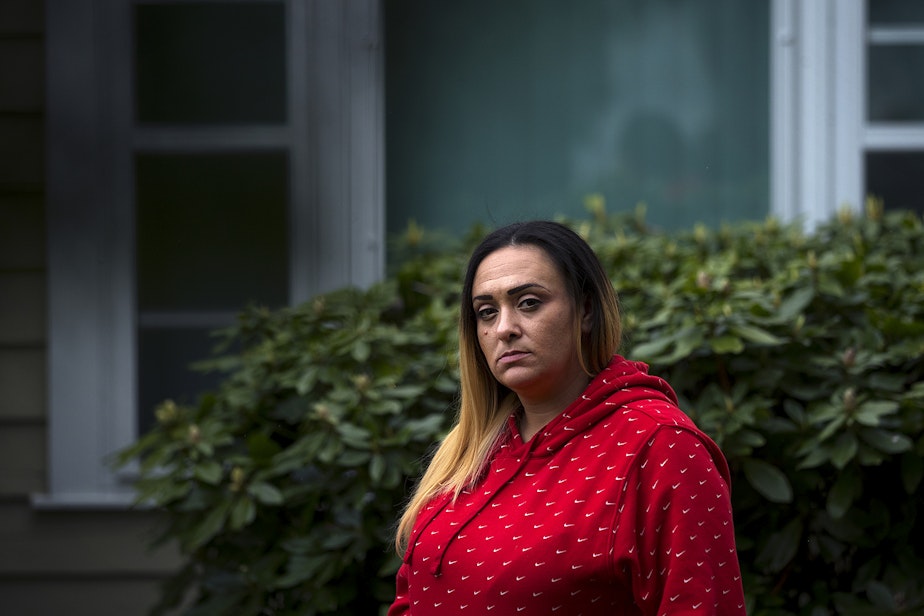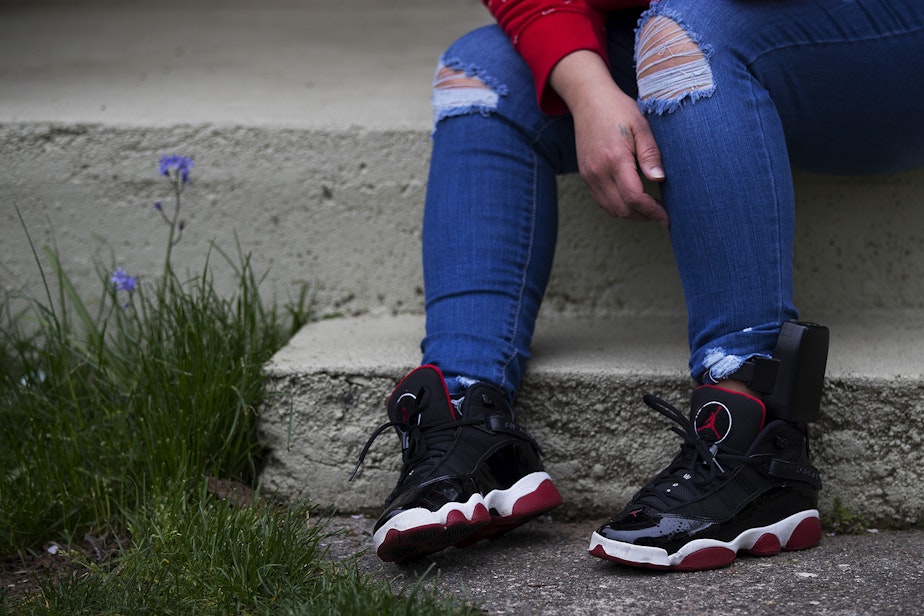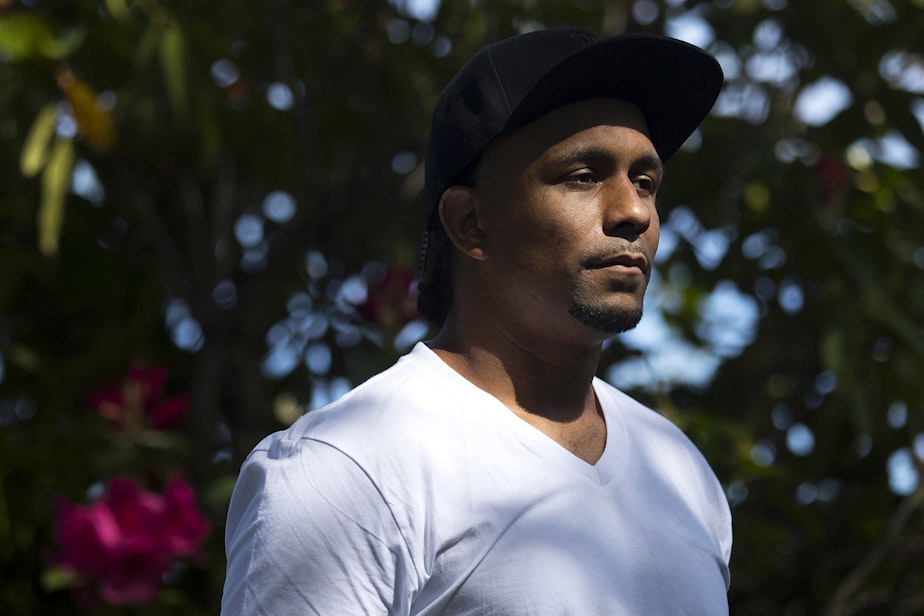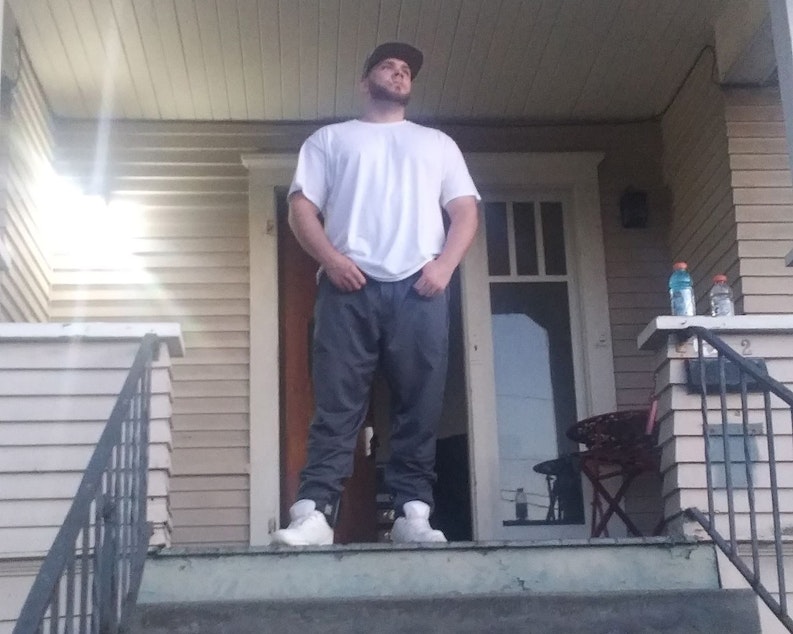‘It’s no get out of jail free card.’ Inmates struggle as they rejoin a society deeply changed by Covid-19

Four inmates told KUOW what life is like now that they have been released from prison -- earlier than expected, as part of an attempt to reduce crowding during the coronavirus pandemic.
‘I thought they would help us more, because this is obviously a pandemic’
Kandis Mello had little confirmation she was being sent home from the Washington Corrections Center For Women in Gig Harbor.
Word had been circulating that it was a possibility, but it wasn’t until Mello was woken up at 7 a.m. and put on a bus that she would discover she would land in downtown Seattle.
She never pictured her homecoming this way.
“Even with coronavirus, I still envisioned being able to surprise my kids in a happy way,” Mello said. “Every single day I cry and worry about what I am supposed to do.”

She is serving the remainder of her sentence at her Seattle home, with no furniture and only the clothes on her back. Her daughter and infant grandchild would have to join her there, as part of Mello’s release stipulations. She couldn’t live alone.
Mello was given a prepaid debit card with $100 already loaded, and a flip phone with 300 minutes of talk time. She was down to 50 minutes on May 1.
Before Mello returned home, the residents who had been living there in her place and paying rent had to leave. And while Mello is now returned to the same home she was in prior to the pandemic, she’s now burdened with a $1,700 rent.
That's a lot of money for someone who cannot work, and who is housebound. An ankle monitor tracks her every move.
“I didn’t think it was going to be like this. I thought they would help us more, because this is obviously a pandemic," she said. "They know the situation we were in, where we’re coming from and maybe they could be a little more helpful.”

‘My heart goes out to all the fellows in there still going through it’
Wesley Mitchell was living at Reynolds Work Release, a re-entry security prison located in downtown Seattle, where currently seven inmates have tested positive for Covid-19.
He would work at United Recycling during the day but spend his nights in the mens-only building. On the fourth floor, where he slept, two others had contracted the virus.
Mitchell, who is due for release on May 25, has asthma.
“I was kind of on edge … anytime somebody would cough or sneeze,” he said. “I didn’t have any protection.”
When inmates would return from work they would get a squirt of sanitizer and a temperature check. Mitchell said one inmate got in trouble for taking three squirts. Because of the state’s emergency inmate response, Mitchell was relocated and now lives with his mother and father. Isolation for at least two weeks was a requirement, he said.
He called his transition home “beautiful.”
Mitchell’s days now consist of helping his parents with chores. On May 5, he was straightening up the basement and planned to cut the grass.
He still worries about the inmates that remain at Reynolds, who are already “halfway in and halfway out” of society.
“I feel good being out of that situation, but my heart goes out to all the fellows in there still going through it,” Mitchell said.
‘Nobody has enough money to support themselves, let alone someone who just got released from prison'

Dallas Barnes didn’t initially have an address to be transferred to. So they found a sober living house in Everett for the 19-year-old man to serve the remainder of his sentence until his July 17 release date.
He filled out paperwork and agreed to the rules and stipulations of the ankle monitor, which all seemed pretty fair, he said.
“It's not a get out of jail free card, that's for sure,” Barnes said.
He said that even with the restrictions, any type of freedom is better than being at Airway Heights Corrections Center in Spokane County, where he said social distancing and mask wearing wasn’t a norm.
Barnes is allowed to go to the store once a week, as long as he gives the Department of Corrections three days advance notice and they approve. Once a week he’s allowed to walk around the block for an hour, but must provide the exact coordinates of his journey.
“Everywhere that I go, I have to tell them exactly how I'm going to get there, and I have to go the fastest route to get to that destination,” Barnes said.
Like Mello, Barnes was provided a $100 prepaid cash card and a phone. His housing is paid for until August.
He has no clothing and little food. And for those without nearby family, who are living with a house of strangers, Barnes said it can be difficult to get resources.
“I've never met these people before, so I'm not going to trust them with … the only hundred-dollar Visa card to my name to go get something for me from the store,” Barnes said. “I am not just going to give something to somebody without knowing them prior because of the life I've lived and the people I've surrounded myself with.”
Barnes said his family lives close by and was able to bring him food. He worries about the others who have gone to houses on the state’s rapid re-entry program with no support system.
And while Barnes is able to apply for food stamps, he was told he wasn’t able to get a job, given that he is still an inmate. For now he must rely on his family to provide for his essential needs, which can be difficult in a grim economy.
“Nobody has enough money to support themselves, let alone someone who just got released from prison who has absolutely nothing,” Barnes said.
‘There was no real mental preparation'

For Scott McGonagle, the relocation was surreal, and happened fast.
“I’ve never seen (the Department of Corrections) move that fast on anything,” McGonagle said.
What is typically a weeks-long process took days if not hours. His new Tukwila address was entered at 3 p.m. Two hours later it was approved.
“There was no real mental preparation,” he said. "It's all of a sudden, like here we go ... you just kind of got sucked into the whirlwind king of thing.”
And returning to a world post pandemic was even stranger.
McGonagle had experienced a release from prison before. He said in that instance, it took a week before he felt like he had “never done time before.”
In that instance, he wasn’t returning to a world where Covid-19 existed.
“Rather than being on the street and watching everything slowly closed down … here's this thing on TV, this abstract kind of thing going down,” he said. “And then all of a sudden, bang, I'm in the middle of it.”
Being released to a city he doesn’t call home added to the dreamlike state he has been experiencing. He preferred to be placed in a setting closer to where he grew up in Seattle, but he understood his placement given the shortage of homes and the “mass exodus of people” coming out from prisons.
McGonagle said he’s dealt with the pandemic by consuming a lot of takeout food, and watching TV.
“I mean, what does everybody else do sheltering in place?,” he said. "I think I'm doing what normal people do at this point. You know what I mean?”

